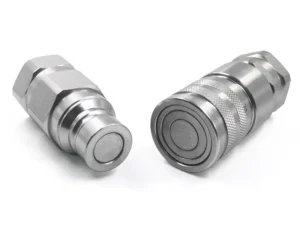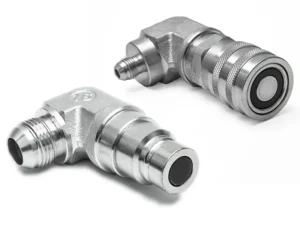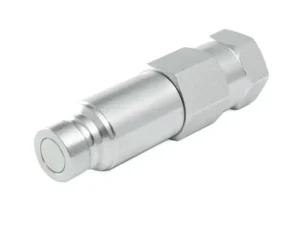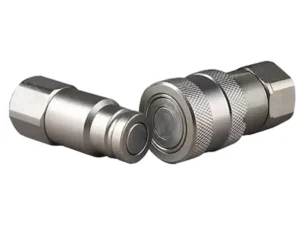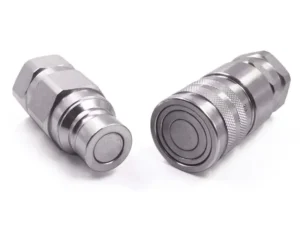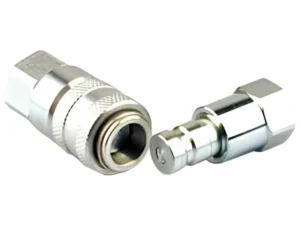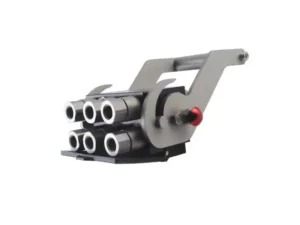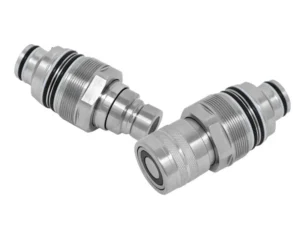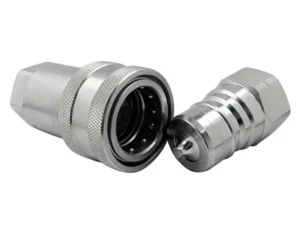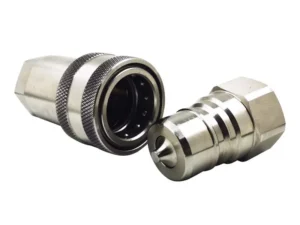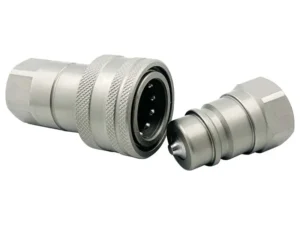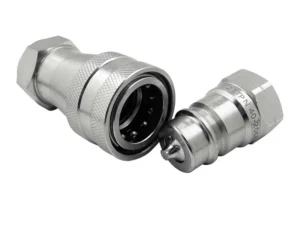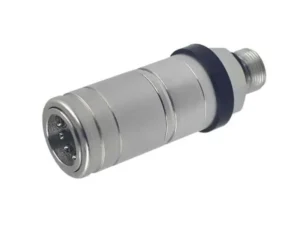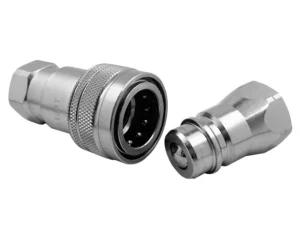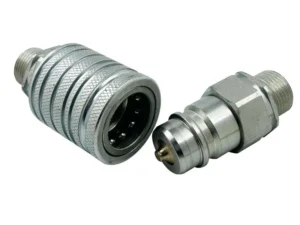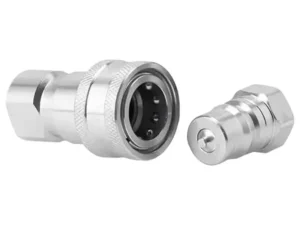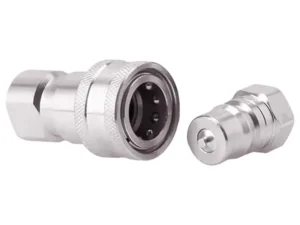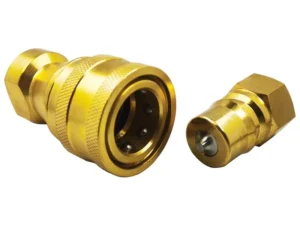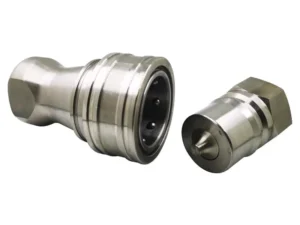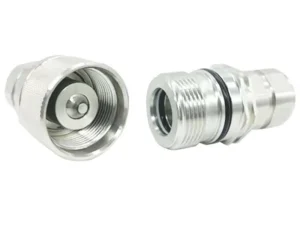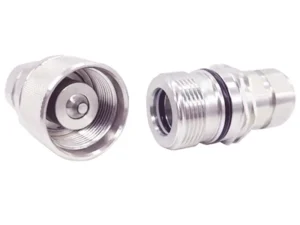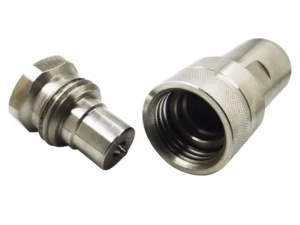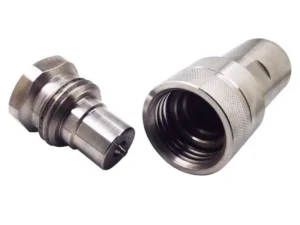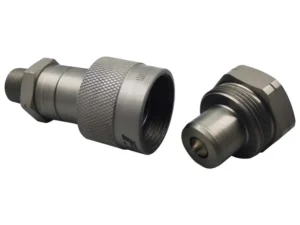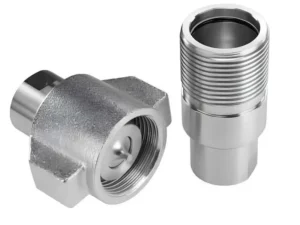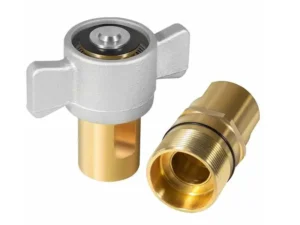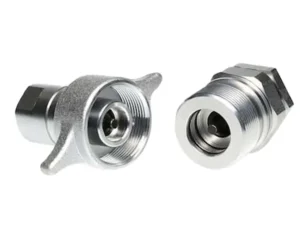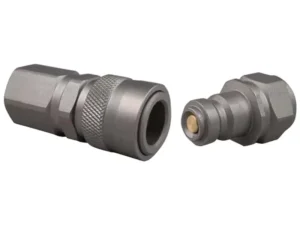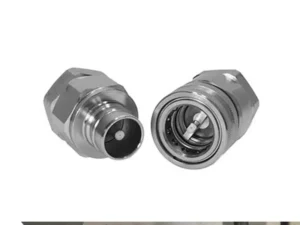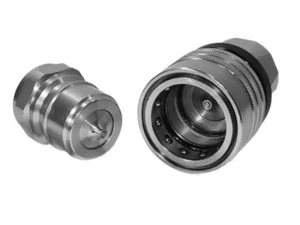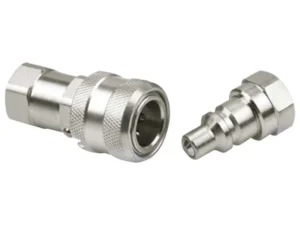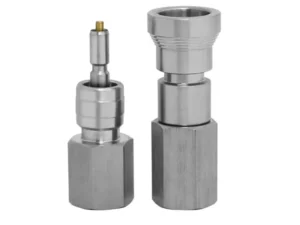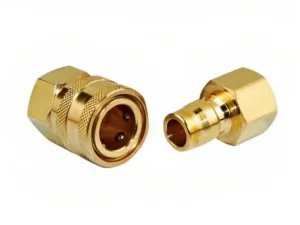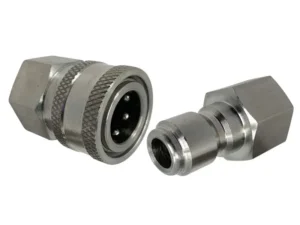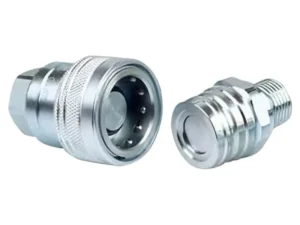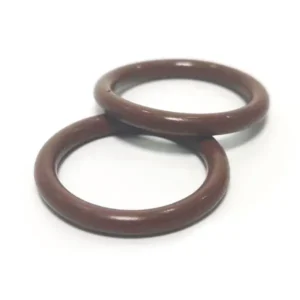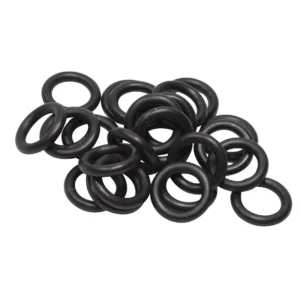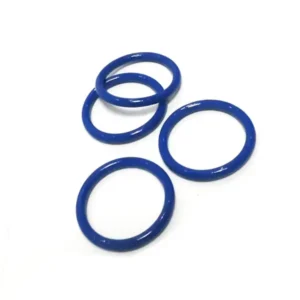How to choose material
Seal Ring material for Hydraulic Quick Coupling
Choosing the right seal material for hydraulic quick couplings is crucial for ensuring optimal performance and preventing leaks in your hydraulic system. Different materials offer varying properties in terms of:
- Temperature resistance:The ability to withstand the operating temperature range of the hydraulic fluid.
- Pressure resistance:The ability to handle the system’s pressure without deforming or failing.
- Chemical resistance:Compatibility with the specific hydraulic fluid being used.
- Abrasion resistance:The ability to withstand wear and tear from friction and movement.
- Compatibility with mating surfaces:Ensuring a tight seal without damaging the coupling or other components.
Here are some of the most common seal materials used in hydraulic quick couplings, along with their key characteristics:
1.Nitrile (NBR)
Nitrile, also known as Nitrile Butadiene Rubber (NBR), is a common and versatile synthetic rubber material widely used in seals due to its favorable characteristics.
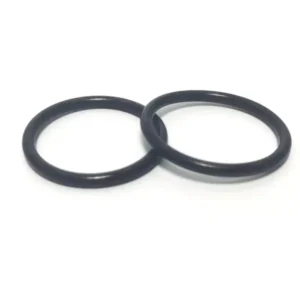
Composition and Properties:
- Made by polymerizing acrylonitrile and butadiene monomers.
- Offers a good balance of affordability, performance, and ease of use.
Key Advantages:
- Excellent oil and grease resistance:Ideal for applications involving lubricants, motor oils, and hydraulic fluids.
- Good water resistance:Performs well in damp environments and with water-based fluids.
- Moderate temperature range:Operates reliably within -40°C to +100°C (-40°F to +212°F).
- Cost-effective:Compared to other high-performance materials like FFKM, NBR offers good value for money.
- Readily available:Widely available in various forms and sizes, facilitating easy sourcing.
- Good abrasion resistance:Withstands moderate wear and tear, extending seal life in dynamic applications.
Limitations:
- Not suitable for high temperatures:Performance deteriorates above 100°C, making it unsuitable for extreme heat conditions.
- Limited chemical resistance:Not compatible with strong acids, alkalis, or oxidizing agents.
- Susceptible to ozone and sunlight:Requires protection from prolonged exposure to these elements.
- Lower temperature resistance than some alternatives:EPDM, for example, performs better in very cold environments.
Most quick couplings used in hydraulic applications use Nitrile seals. Because the fluid is usually hydraulic oil, Nitrile not only has good sealing performance, but also because of its low cost.
2.Fluorocarbon (FKM)
FKM, also known as fluorocarbon or Viton (Dupont trade name), is a high-performance elastomer renowned for its exceptional resistance to harsh conditions and demanding applications. Here’s a breakdown of its key characteristics and areas of use:
Composition and Properties:
- Fluoropolymer elastomer: FKM consists of polymer chains with carbon backbones heavily saturated with fluorine atoms. This fluorine-rich structure bestows its remarkable properties.
Key advantages:
- Outstanding temperature resistance:Operates reliably from -40°F to +392°F (-40°C to +200°C), exceeding most other elastomers.
- Exceptional chemical resistance:Compatible with a vast range of aggressive chemicals, fuels, and solvents, including acids, alkalis, and hydrocarbons.
- High pressure tolerance:Handles high pressures effectively, making it ideal for demanding hydraulic and pneumatic systems.
- Low friction coefficient:Reduces wear and tear, extending seal life and boosting system efficiency.
- Excellent fire resistance:Passes stringent fire-resistance tests, enhancing safety in critical environments.
Limitations:
- High cost:Compared to other elastomers like NBR, FKM is a more expensive material.
- Limited compatibility:While highly resistant to many chemicals, not all are compatible with FKM. Consult compatibility charts before use.
- Processing challenges:Fabrication and machining of FKM require specialized tools and techniques due to its high strength and chemical resistance.
Usually stainless steel series or brass series quick connectors will use FKM as the sealing ring material. Because stainless steel materials or brass materials are usually used for corrosive fluids, chemical liquids or solutions. FKM can meet the needs in most cases, but when customers want to use some special liquids, they must communicate with us. For example, peroxide, FKM cannot be used. FFKM is another option
3.Ethyl Propylene Diene Monomer (EPDM)
EPDM, or ethylene propylene diene monomer, is a versatile and popular synthetic rubber material widely used in seals due to its unique properties and broad range of applications. Here’s a dive into its key characteristics and where it excels:
Composition and Properties
- Made by co-polymerizing ethylene, propylene, and a small amount of a diene monomer, resulting in a strong and flexible material.
Key advantages
- Excellent ozone and sunlight resistance:Unlike many other elastomers, EPDM does not deteriorate significantly when exposed to sunlight or ozone, making it ideal for outdoor applications.
- Good water and steam resistance:Performs well in damp environments and with water-based fluids, including steam.
- Moderate temperature range:Operates reliably within -40°C to +120°C (-40°F to +248°F), suitable for most general applications.
- Cost-effective:Compared to high-performance materials like FFKM, EPDM offers good value for money.
- Good electrical insulation:Suitable for applications requiring electrical isolation.
- Good aging resistance:Maintains its properties over time, extending seal life.
Limitations
- Limited oil and grease resistance:Not ideal for applications involving strong hydrocarbons, such as engine oils or fuels.
- Not suitable for high temperatures:Performance weakens above 120°C, making it unsuitable for extreme heat conditions.
- Limited chemical resistance:Not compatible with strong acids, alkalis, or oxidizing agents.
Because EPDM is good water and steam resistance and is suitable for the food industry, it can be in contact with food and will not pollute. A large number of our customers are used in the food industry and can pass through water, steam and other applications.
4.FFKM, or perfluoroelastomer
FFKM, or perfluoroelastomer, is a high-performance seal material known for its exceptional properties and suitability for demanding applications. FFKM consists of long chains of carbon atoms with all their hydrogen atoms replaced by fluorine atoms. This unique fluorine-rich structure delivers its remarkable properties.
- Exceptional temperature resistance: Operates reliably from -75°F to +617°F (-60°C to +325°C), exceeding most other elastomers.
- Outstanding chemical resistance: Compatible with a vast range of aggressive chemicals, fuels, and solvents.
- Exceptional pressure resistance: Handles high pressures effectively, making it ideal for demanding hydraulic and pneumatic applications.
- Low friction coefficient: Reduces wear and tear, extending seal life and improving system efficiency.
- Excellent fire resistance: Passes stringent fire-resistance tests, enhancing safety in critical environments.
FFKM Used in aerospace, chemical processing, oil and gas, semiconductor manufacturing, and other industries where extreme temperatures, harsh chemicals, and high pressures are encountered. Due to its low outgassing and chemical resistance, FFKM is used in applications requiring minimal contamination risk, such as pharmaceutical and medical equipment.
Limitations:
- High cost:Compared to other elastomers, FFKM is a more expensive material.
- Limited compatibility:While highly resistant to many chemicals, not all are compatible with FFKM. Consult compatibility charts before use.
- Processing challenges:Fabrication and machining of FFKM require specialized tools and techniques due to its high strength and chemical resistance.
The following two sealing materials are not common in quick connectors and are only used at the request of customers under very few special needs.
5.Polyurethane (PUR)
PUR, or polyurethane, is a broad category of versatile plastic materials with diverse properties and applications. In the context of seal materials, several specific types of PUR are used, each offering unique advantages and limitations. Here’s a breakdown of some key points:
Types of PUR Seal Materials
- Castable PUR:Offers outstanding abrasion resistance and high load-bearing capacity, making it suitable for heavy-duty applications like hydraulic seals and bearings.
- Extruded PUR:Available in various profiles and shapes, ideal for dynamic seals in pistons, rods, and other moving components.
- Foamed PUR:Provides excellent compression and shock absorption, useful for static seals and gaskets requiring flexibility
General Advantages of PUR Seal Materials
- Good abrasion resistance:Resists wear and tear, extending seal life in demanding environments.
- High tear strength:Withstands mechanical stress and prevents seal failure.
- Low friction coefficient:Reduces energy consumption and wear in dynamic applications.
- Good chemical resistance:Depending on the specific type, PUR can resist various oils, greases, and mild chemicals.
- Wide temperature range:Some PUR types can operate reliably across broad temperature ranges, from -40°C to +130°C (-40°F to +266°F).
Limitations of PUR Seal Materials
- Limited compatibility with aggressive chemicals:Not suitable for harsh chemicals like strong acids or alkalis.
- Susceptible to hydrolysis:Can degrade in high-moisture environments.
- Lower fire resistance compared to some alternatives:Needs additional fireproofing treatments for specific applications.
- Cost can vary depending on specific type and properties:Generally more expensive than some other elastomers like NBR.
The PUR material usually would be asked to used in some quick couplings due to their abrasion resistance and high load capacity.
6.Thermoplastic Elastomer (TPE)
TPE, or thermoplastic elastomer, is a fascinating material that bridges the gap between rubber and plastic. It combines the flexibility and elasticity of rubber with the processing advantages of thermoplastics, making it a valuable choice for various sealing applications. Here’s a breakdown of its key characteristics and strengths:
Benefits of TPE Seal Materials
- Exceptional flexibility and elasticity:Offers rubber-like properties like good compression set and resilience, ideal for forming tight seals against uneven surfaces.
- Easy processing:Can be processed like thermoplastics through injection molding, extrusion, and blow molding, enabling faster and more cost-effective production compared to traditional rubber vulcanization.
- Broad temperature range:Can perform reliably across a wider temperature range than some rubbers, often from -40°C to +130°C (-40°F to +266°F).
- Good chemical resistance:Many TPE types offer resistance to oils, greases, and mild chemicals, expanding their potential applications.
- Recyclable:Can be recycled in some cases, contributing to sustainability efforts.
- Customization:Available in various hardness levels, surface textures, and colors to meet specific needs.
Limitations of TPE Seal Materials
- Lower tear strength and abrasion resistance compared to some rubbers:Might not be suitable for heavy-duty applications with high wear and tear.
- Limited compatibility with aggressive chemicals:Not all TPE types offer good resistance to strong acids, alkalis, or solvents.
- Higher cost than some basic elastomers:Can be more expensive than materials like NBR, especially for complex shapes or specialized properties.
TPE materials are usually used when customers would use the quick coupling in the medical industry or Food in dustries.
- Medical and pharmaceutical equipment:Employed in seals for syringes, tubing, and other devices due to their biocompatibility and chemical resistance.
- Food and beverage processing:Suitable for seals in pumps, valves, and packaging equipment due to their food contact compliance and ease of cleaning
Generally speaking, the sealing ring material used in most quick couplings used in hydraulic applications is Nitrile, because the liquid passing through is usually hydraulic oil, which can meet the needs well and is relatively cheap. Quick connectors made of stainless steel or brass usually pass corrosive liquids, so we use FKM sealing materials by default. Some quick connectors used in the food industry, for quick connectors that pass water or steam, will use EPDM. Customers can also customize their own sealing material requirements according to their own needs.
